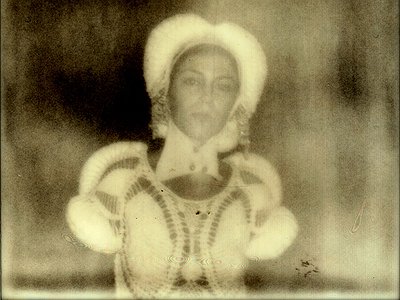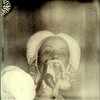Part 1
Name: Marina Herlop
Occupation: Composer, vocalist, producer, sound artist
Nationality: Catalan
Recent release: Marina Herlop's new album Pripyat is out via PAN.
If you enjoyed this interview with Marina Herlop and would like to find out more about her work, visit her on Instagram, and twitter.
When did you start writing, producing play music? And what or who were your early passions and influences?
Since I was a kid, there have been different waves or important moments, in which I felt like a strong pull towards music. I remember, as a very little kid, feeling a sort of electric vibe or feeling when I was listening to certain music at home, for example. Then as a teenager, I had another wave in which I was obsessed about punk rock and Blink 182 and The Offspring and those bands and I was constantly seeking out new music. When I was in my early 20s, I had another wave during which I started looking for more experimental music, and my taste maybe got a bit more refined or sophisticated.
Then, when I joined the conservatory when I was 23, or so, I got exposed to a big amount of classical pieces. And that changed my perception of music.
I don't know what specifically draws me to music. It's like a key pressed in my inner core. Especially because music is not that related to everyday human stories or what goes on in the world. Novels, or films or paintings usually have a concept behind them related to human lives. And music does not always have that.
I find that fascinating because this means that music can detach you from the world for a while. Rhythm and melodies give you a particular feeling and move you. I find that fascinating.
Some people experience intense emotion when listening to music. What's your listening experience like? And how does it influence your approach to music?
I don't usually see colours or shapes or any figures. I don't have a very well trained synaesthetic experience. If I try, I can do it, but I have to look for it or force it. It doesn't come in a natural way when I'm listening. For me, it's just about the music. And I can close my eyes. And it's as if I can see the sounds placed in in the space. And that's enough for me.
The feeling that I look for and that I've been looking for, especially over the last years, is a form of pleasure that comes from the beauty of music. It's an aesthetic feeling. I am not looking to feel happy or sad. Of course, when you feel in a certain mood, you put on certain music to enhance that feeling. But when it comes to the music I make, I don't want to make a sad song, or a happy song or a “fierce” song. I just want to make music that is aesthetically well constructed and that is beautiful.
How would you describe your develop development as an artist in terms of interests and challenges, searching for a personal voice as well as breakthroughs?
The path, or tendency I've been following is that I'm not that interested in finding a personal voice anymore. Maybe that happens as a side effect. But what I'm aiming for, is to make music that I see as a building. It needs to be well constructed, well built. If there's a storm, the building has to remain standing. To me, this means that it needs to have a consistent structure. The structure, the parts of the song, need to make sense. And also the sounds and the instrumentation and all the elements need to respect each other so that there's enough room for everyone in the song.
If you achieve that, you may like the song or not, or you may connect to it in a more or less personal way. But either way, you'll know the song is well constructed regardless. I's hard for me to achieve that. But that's my current challenge in music.
Tell me a bit about your sense of identity and how it influences both your preferences as a listener, and your creativity as an artist, please.
To be honest, I don't think much about this. I think more about being honest, and making music that satisfies my personal demands, or my personal criteria.
I'm pretty demanding when it comes to music in general, and especially the music I make. When I make music I don't think about my sense of identity. In fact, when I'm really deeply focused on an album, this sense of identity or this sense of ego starts to vanish. And you do realise that it happens to you, as the person who's making the music, but that's not the point. The point is that you are reaching a space that is bigger even than humanity as a species. It's something superior. That's where you get when you make music.
And what you realise as part of this process is that your self identity or your aim of expression or your will to express your feelings is something pretty absurd compared to the vastness of music and art.
What would you say are the key ideas behind your approach to music and art?
Apart from what I've already said in the previous replies, one of the key ideas is for the music to reflect certain archetypes, formulas, structures, or proportions that have been there since the beginning of time, that are eternal. I'm talking about principles that you can find everywhere, not just in other art forms, but also in nature and in human relationships. These patterns are there for a reason. And if you don't respect them, you have to be aware of this and your reasons for not doing so. You need to find an elegant way to subvert or to yet to play with those patterns. So that's one part of the answer.
On the other hand, I think the music one makes needs to reflect the time we're living in. That doesn't mean it needs to specifically talk about climate change or about a breakup you just went through. Rather, it means that there must be something in the music - just in the music alone - that talks about the presence. And that's very abstract and subjective, but that's my personal challenge.
I'm not saying all music needs to combine those two things. But in the music I make, that's what I try to attain.
How would you describe your views on topics like originality and innovation versus perfection and timelessness in music? Are you interested in a music of the future or continuing a tradition?
This is closely related to what I just said. I've sometimes thought about dragging the music to the future. That doesn't mean literally dragging it to the future, because you can't reflect on something that has not happened yet. But sometimes music sounds futuristic because it's talking about the most recent present, and I think there's a tendency, to not take any risks, especially in pop music, and rely on formulas that we know will work. The music that is more avant garde is not fearful to play, to experiment with new instruments, with new sonorities, with new harmonic progressions that may be more faithful to what is actually going on in the present moment.
We might call it futuristic, but I don't think it's really futuristic. I think it talks both about the present and about continuing a tradition of course - I think both things are compatible and both things should be present.
Over the course of your development, what have been your most important instruments and tools - and what are the most promising strategies for working with them?
On the first two albums I made, the tools were piano and my voice.When I found something interesting while playing, I would record it with my phone, including some performance instructions. Like: In the left hand, I'm playing this note, in the right hand I'm playing that note - because otherwise, I would just forget. And then I picked the voice notes that I liked the most. And I tried to construct a bigger song by blending the parts that I liked. It was a pretty complex process that happened mostly inside my head.
I started using the computer. I was very reluctant to do so because I'm not very fond of new technologies. But I thought it was time because the way my process was, I kept making the same music in a way. I needed new tools to make new music. With new tools come mistakes. You don't have a pattern and you don't have a routine. So you're more likely to come up with fresh ideas, even though the process is more clumsy and chaotic.
I'm now working with the computer, but I don't really have a pattern. It's different for every song. I might start for example, by going to the piano and looking for a chord progression, then bring it to the computer and maybe add some recordings in MIDI. And then look for some texture that I like. On top, I could add melodies or I could put some percussion samples.
The fact that it changes every time means you get lost easily. And it's not very pleasant sometimes. The process feels like a struggle. Sometimes it feels like you have no idea what you're doing. But from that struggle, you get to ask yourself what it is, exactly, that you like, and what you don't, what's working, what's not working and why. And then you get to find interesting things that you didn't know you could make.
Take us through a day in your life, from a possible morning routine through to your work, please.
I would love to have a routine. Because I am very productive when I follow a routine. But that's not possible at the moment because there are so many things that I have to do that usually are not even related directly to music. I even I wake up at a different time every day, I do different things.
But I can talk about my ideal routine, like what I was doing last year when I was not that busy. I would wake up at 6:30 because I'm a morning person, have a tea. At 7:00, I would reply to some emails and WhatsApp. The advantage of doing this in the early morning is that everyone is asleep, and you can answer messages and they don't reply.
I also like making music in the early morning. I will turn on my computer and start producing some some work that I have to do or mixing or finishing some stuff. And then when it's 9:30 I usually start making noise because the neighbours are up. So I can, for example, play the piano for two hours. I would love to play piano every day for two hours. And then also I can do my vocal training.
I would love to play piano for two hours every day and sing for one hour every day. And then work out for one hour because that helps your mind to refresh and feel empowered and also your body. For me that's enough in terms of practise: Two hours of piano and one hour of of singing and two hours of music production and I I would also like to have some time to read about music or watch stuff related to music. But that's an ideal that never happens to be honest.






